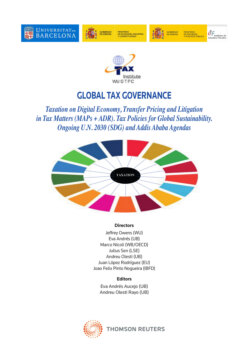Читать книгу Global Tax Governance. Taxation on Digital Economy, Transfer Pricing and Litigation in Tax Matters (MAPs + ADR) Policies for Global Sustainability. Ongoing U.N. 2030 (SDG) and Addis Ababa Agendas - Jeffrey Owens - Страница 14
На сайте Литреса книга снята с продажи.
Presentation 4 THE DIGITALIZATION OF TAX ADMINISTRATIONS: A COMMON DENOMINATOR OF COMPLIANCE RISK MANAGEMENT PROCESSES. The EUROPEAN UNION (E.U.) Risk Management for Tax Administrations Model
ОглавлениеEva Andrés Aucejo (*)
Full Professor of Financial and Tax Law. University of Barcelona
In the new global economy, digitalization of the tax administrations has become a central issue for effective global tax governance.1 Digitalization of tax administrations is fast becoming a key instrument in the present, digitalized world2.
Research findings into the digitalization of tax administrations have led to a renewed interest in developing and developed countries.3
It is becoming increasingly difficult to ignore that “Tax Cooperative Compliance Programmes” and Tax Risk Management Processes for Tax Admnistrations; are valuable instruments that allow tax administrations to optimize the efficiency of their results and efficiently allocate available resources. A growing body of scientific literature4, international and regional organizations sources,5 and administrative doctrine6 recognise the relevance of this phenomenon noted.
Nowadays we are witnessing the second globalization era, which, among other factors, is characterized by the existence of open economies in which complex financial operations are carried out and where very sophisticated financial systems also frequently operate.
In this open, complex and global framework (in which the discussions of the G-20/OECD and the BEPs inclusive framework are relevant, among other considerations), there are still gaps such as the fair tax regime to transactions between transnational companies and the thorny, as-yet-unresolved issue of international transfer prices global regulation or the pending global challenge to a global taxation of the digital economy.
Clearly, in this open, complex and global framework, the role of tax administrations cannot be left behind; that is, tax administrations must adopt as a priority the role of adapting to the growing needs of a digitalized context, where transnational operations through digital platforms are becoming more and more prevalent and where it is very necessary to have developed international information platforms. That is the present and future reality for both developing and specially non-developing countries.
We would like to highlight “The digitalization of tax administrations” as a pivotal element of “Tax risk management processes”. Our starting hypothesis intends to show the relevance of the “Digitalization of Tax Administrations” as a common denominator of every phase of the risk management processes for Tax Administrations.
The find outs derived from the verification of this hypothesis may be a reference in decision-making concerning the need for states to invest in digitization processes of tax administrations. A conclusion that is further reinforced as a consequence of the crucial moment we are experiencing due to the COVID-19 pandemic, which has led tax administrations worldwide to observe a generalized phenomenon consisting of a decrease in tax collection.
This hypothesis can be demonstrated following, for instance, the “Risk management for tax administrations” model developed by the European Commission.7
We will focus our attention on the risk management for tax administrations system of the European Commission, considering it as a model in the study of tax risk management, with an interesting design of the different phases of the process.
This model constitutes one of the different theoretical-practical models that exist in the realm of compliance risk management for tax administrations, together with other ones such as the OECD, ISO 31000, or revised Kyoto Convention, HMRCCUK etc.8 All of them are processes based on the analysis of the tax risk of tax administrations as well as on promoting and reinforcing tax compliance as an optimal system for prevention of tax breaches; to avoid future fiscal risks and to design preventive procedures for the elimination and prevention of tax risks.
Both factors, digitalization of tax administrations and voluntary compliance with tax obligations, were highlighted in the first plenary meeting of the tax administration European Union Summit (TADEUS), held in 2019, where the two first challenges of tax administrations were identified as the following: a. The digital economy and the digitalization of tax administrations; and b. The generation of trust between taxpayers and tax administrations and the improvement of tax compliance by promoting legal certainty and the management of tax risks.
In the following pages we will briefly present the risk management model for tax administrations of the European Commission. We would like to highlight the idea that the digitalization of tax administrations is a fundamental instrument to enhance and improve every phase of the tax risk management process for tax administrations.
Do not doubt that the skilled reader could subscribe to the previous conclusion by analysing the different phases of the tax risk management process: 1. Risk identification, 2. Risk analysis, 3. Risk prioritization, 4. Risk treatment and 5. Risk assessment.
Eva Andrés Aucejo9
Full professor of Financial and Tax Law.
University of Barcelona
RISK MANAGEMENT FOR TAX ADMINISTRATIONS
FROM
EUROPEAN COMMISSION
EUROPEAN COMMISSION. DIRECTORATE-
GENERAL TAXATION AND CUSTOMS UNION
Indirect Taxation and Tax administration
EUROPEAN UNION RISK MANAGEMENT MODEL
We will try to present the central MODEL proposed by the European Commission for Risk Management of Tax Administrations through a few brief notes. To define the phases that make up the strategy within the European Commission’s tax risk management model, the following three concepts are defined: 1.– Context, 2.– Objectives and 3.– Strategies.
